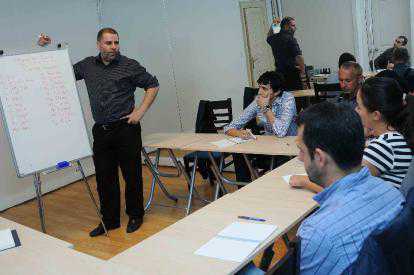ISTANBUL – Hürriyet Daily News

Istanbul’s Geoaktif Culture and Activism Center is now providing classes in six Anatolian languages, ranging from Armenian to Laz. The classes, a first for Turkey, are attracting interest from a wide variety of ethnic backgrounds, says Cemal Atila, the center’s founder, who adds the lessons are testament to a changing Turkey
In addition to students coming from a number of different ethnic backgrounds, many Turks are also interested in the center, says Cemal Atila, founder of Geoaktif. DAILY NEWS photo, Hasan ALTINIŞIK
A new center in Istanbul’s Taksim neighborhood has begun to offer courses for a number of under-threat Anatolian languages, providing a tangible example of the societal changes currently occurring in Turkey, according to the location’s founder.
“In the last few years, racist approaches have fallen apart as small and new institutions, like ours, are sprouting out through the cracks,” Cemal Atila, head of the Geoaktif Culture and Activism Center, recently told the Hürriyet Daily News & Economic Review.
The center is taking applications from people eager to learn a variety of languages spoken in Anatolia, including Armenian, Kurdish, Laz, Persian and Zaza. To date, no language center in Turkey has ever tried to provide classes in such a broad variety of tongues.
In addition to students coming from a number of different ethnic backgrounds, many Turks are also interested in the center, said Atila.
“Anyone can join us. There is no preparation class or anything. But we rather act prudently and examine applicants before they start courses,” said Atila, adding that they currently had a total of 25 students.
Lack of teachers fluent in languages
Although the center started activities in October it has still suffered from a lack of teachers fluent in all the languages offered, Atila said.
“We didn’t want to stop despite all odds and just found a few teachers,” he said. “[But] the important thing is to make a start at some point.”
Despite the growing pains, the center hopes to add new languages to those already offered and ultimately work toward the survival of all Anatolian languages, Atila said.
The cultural policies that led to the suppression of marginal languages in favor of the national language, Turkish, have occurred in countries throughout the world that have felt the need to create its own nation-state, Atila said.
“The only difference we have in Turkey is that pressures are stronger and last longer. But it is exhilarating to see such staid oppression dying out,” he said.
‘Turkey is changing’
Although the greater openness toward plurality in Turkish society suggests a move in a positive direction, Atila said it was important to remember that society was not monolithic.
“A significant part of society seriously questions official ideology and its oppressive system. They are aware of the social and cultural damage caused by this ideology. But this, at the same time, creates a reverse process,” he said. “Though intellectuals, writers and artists claim to be modern and the pro-Western, they can show hostility toward local ethnicities. Many intellectuals and artists, who are so-called humanists and world citizens, have raised objections to Kurdish education. They say the introduction of such a right divides the country.”
Despite the dilemma, Atila believes some things have started to change in Turkey. “The word Armenian was used a cuss word for years. Who could have opened an Armenian-language course in this country?” he asked.
Ethnic language courses will spread
The center is also hoping to organize discussions and conferences with the participation of linguists in the near future.
The center also aims to spread out throughout Turkey, Atila said, adding that they would also involve themselves in the preservation of cultures, cuisines, music and dances of different ethnicities in the country.
“Within a few years, we’ll have more detailed studies. And of course we will not be satisfied with the ethnic languages of this land. We will concentrate on world languages and cultures, be involved in cultural activities and question some certain elements,” he said.

Leave a Reply